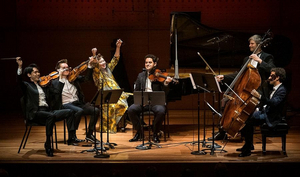PBS Film Recounts Chamber Music Society's Return To Lincoln Center
The documentary captures the passion for making music that pushed the CMS community forward at every turn.

In March 2020, when the world shut down, the Chamber Music Society of Lincoln Center closed its doors. Now, a new two-part PBS film, CHAMBER MUSIC SOCIETY RETURNS, tells the story of CMS's return to live concerts at Lincoln Center's Alice Tully Hall and on a six-city national tour. The documentary captures the passion for making music that pushed the CMS community forward at every turn.
The film features behind-the-scenes footage in CMS's rehearsal studios, backstage, and offices; musicians revealing their relief at finally leaving the isolation of the pandemic behind; and the jubilant performances that represented the long-awaited return to the stage, full of emotion, embraces, and tears of joy.
Even in the early days of the pandemic, when live concerts were impossible, CMS found ways to keep audiences and musicians connected and provide the desperately needed comfort that music can provide in times of crisis and loss. David Finckel and Wu Han, CMS artistic directors, created more than 180 digital programs during the lockdown, and CMS led the way for chamber music organizations around the country, providing digital concerts for them to share with their communities. Throughout the lockdown, CMS and its artists yearned to be back at Lincoln Center with live audiences, and when in-person concerts once again became possible, they were ready to take on the unprecedented logistical challenges that awaited them.
At the start of the film, David Finckel explains succinctly why live music is special. "Listening to a recording," he says, "is like looking at a painting on a wall. It can be a great painting, but it doesn't change. It's always exactly the same. The live performance, though, is so far beyond the recording or the painting on the wall in that it's like watching the artwork itself being recreated by the artist in front of your eyes in real time. Because live is always an interpretation. It's never the same twice."
This is where Part 1 of the documentary, "Setting the Stage," begins. After a year and a half away from a darkened stage, the CMS community bands together to prepare for its first opening night since the onset of the COVID-19 pandemic, facing a host of new processes and protocols, with uncertainties around every corner. Violinist Arnaud Sussmann, bassist Joseph Conyers, cellist David Finckel, and pianist Wu Han talk about the frightful and solitary early stages of the pandemic, the solace that music brought them during that time, and their renewed appreciation for playing with each other and in front of live audiences. Viewers get to see the everyday work of chamber musicians: ensembles rehearsing and conferring on tempi and tone, and Joseph Conyers taking apart his giant double bass and packing the great instrument, custom built for him, into its rectangular steel travel case. As opening night approaches, the anticipation is palpable.
Punctuating this first hour of the documentary are performances of both solo Bach and works from the opening night concert, including the meditative and noble second movement, Adagio con espressione, from Beethoven's C minor String Trio, Op. 9, No. 1; the intimate yet playful Rondo in A major by Schubert; and the exuberantly virtuosic finale, Allegro vivace, from Mendelssohn's D major Sextet.
Part 2, "Bringing Down the House," leaves the glow of opening night behind and lets us see the CMS community getting back to the work of presenting a season of concerts in this new landscape. Among the challenges is finding a way to safely gather over a dozen wind players for whom performing was considered risky earlier in the pandemic (due to the possibility of their breath helping to spread COVID-19). Hearing clarinetist Anthony McGill reflect on the particular challenge of COVID-19 for wind players - and the particular danger this disease posed for the lungs - we understand even more the artists' renewed appreciation for the ability to play music as a community once more.
As December approaches, CMS prepares for the 28th year of its eagerly anticipated holiday tradition, which did not take place in December 2020: presenting all of Bach's Brandenburg Concertos to welcome in the holidays, first on tour and culminating in performances at Alice Tully Hall. Twenty musicians travel to six cities over ten days, running into a host of setbacks, from inclement weather and travel delays to cataclysmic malfunctions. Cellist Dmitri Atapine, flutist Tara Helen O'Connor, and violinist Arnaud Sussman recall their travails as the ensemble made its way from Chicago, IL to Reno, NV to Costa Mesa, CA to Davis, CA to Palm Beach, FL to Princeton, NJ. But nothing can keep the intrepid musicians from finding a way to perform Bach's glorious music for the gathered audiences, who offer thunderous applause and standing ovations in return. As the tour comes to a triumphant close, the resilient artists return home to New York City to perform the Brandenburg Concertos at Lincoln Center's Alice Tully Hall for their local community, even as the growing Omicron variant raises new questions about what the future brings.
"Bringing Down the House" is anchored by Mozart's enduring "Gran Partita", K. 361 as well as Bach's Brandenburg Concertos No. 3 and 4.
Videos

